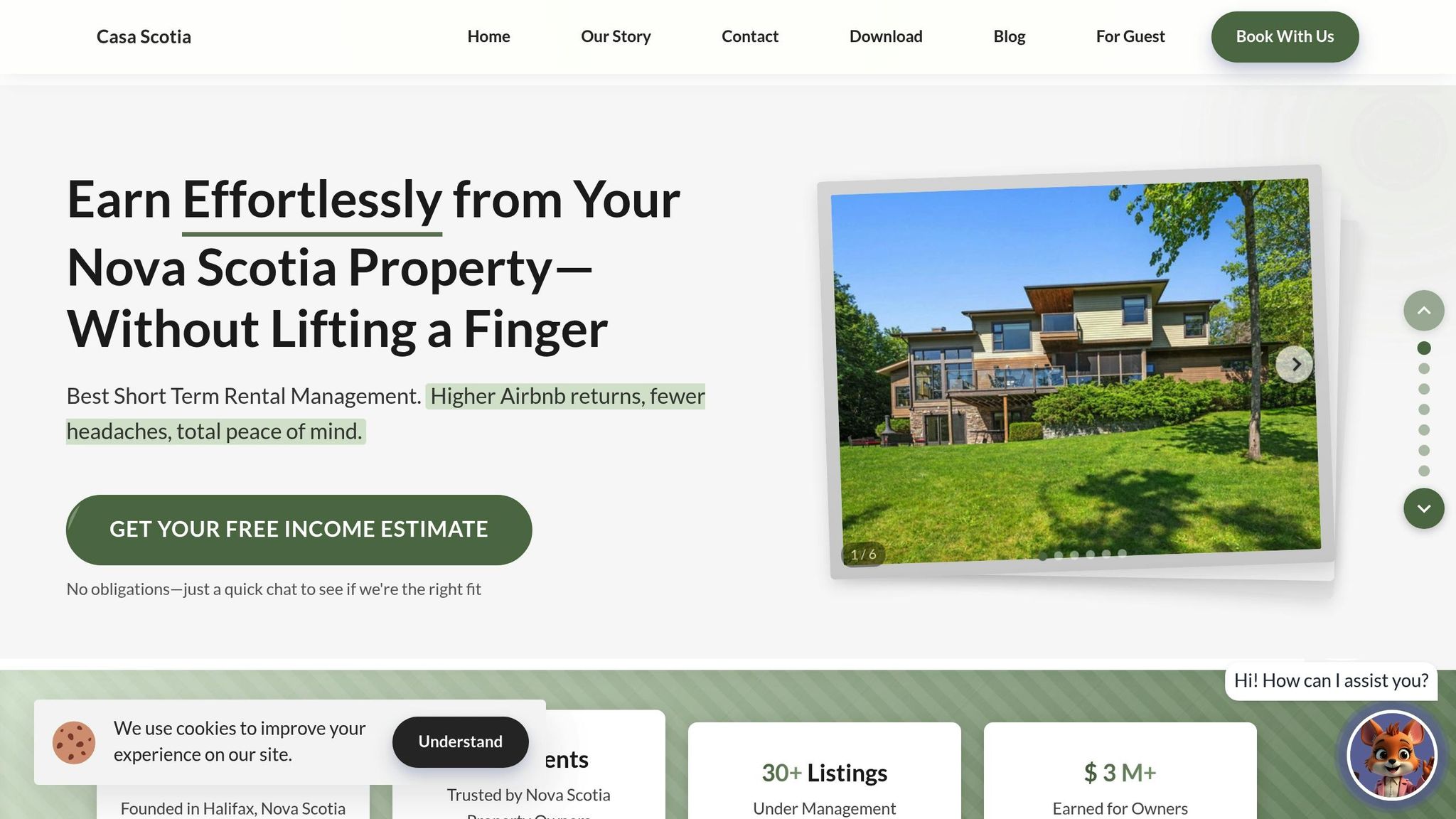Managing short-term rentals on Nova Scotia's South Shore offers great potential for steady income, thanks to the area's scenic towns and year-round tourism. However, success depends on understanding local regulations, seasonal demand, and the unique challenges of coastal properties. Here's what you should know:
- Tourism Opportunities: Towns like Lunenburg, Mahone Bay, Chester, and Bridgewater attract visitors with their maritime heritage, festivals, and natural beauty, ensuring demand across all seasons.
- Seasonal Pricing: Summer rates range from $375–$525 per night with occupancy as high as 95%. Off-season rates drop to $150–$250 per night, but amenities like fireplaces or hot tubs can boost bookings.
- Regulations: Each town has specific rules. For example, Lunenburg requires permits for historic properties, while Bridgewater enforces stricter business standards, including a 30-day rental minimum.
- Coastal Maintenance: Salt air and humidity demand regular upkeep, from cleaning exteriors to checking HVAC systems. Staging with durable furniture and highlighting seasonal amenities can attract guests year-round.
- Technology and Monitoring: Tools like smart locks, dynamic pricing software, and remote monitoring systems simplify operations and improve efficiency.
- Financial Planning: Budgeting for seasonal income fluctuations and meeting tax requirements (e.g., municipal marketing levies) is essential for long-term profitability.
For property owners seeking ease and higher returns, local management services like Casa Scotia handle everything from guest screening to dynamic pricing, allowing you to focus on earnings without the hassle.
Local Regulations for Short-Term Rentals
If you're operating a short-term rental in Nova Scotia, it's crucial to understand and follow both provincial and municipal regulations. Each South Shore community has its own rules for vacation rentals, so staying updated can save you from unexpected disruptions or expenses.
Provincial Registration Requirements
In Nova Scotia, most short-term rental operators need to register their properties with provincial authorities. This process involves submitting property details, confirming insurance coverage, and renewing your registration on a regular basis. Once approved, you'll receive a unique identifier that must appear in your marketing materials and booking confirmations as proof of compliance. Make sure your insurance and liability coverage meet the province's minimum standards to avoid any issues.
Municipality-Specific Rules
Beyond provincial requirements, individual South Shore communities have additional regulations tailored to their local needs:
- Lunenburg: Operators may need extra permits to protect historical properties. If your property requires exterior changes, you’ll have to follow specific guidelines.
- Mahone Bay: A business licence might be necessary, and you may need to designate a local contact person to handle guest or neighbour concerns. Be sure to follow rules around quiet hours and parking to align with community expectations.
- Chester: Regulations here can vary depending on property size and guest capacity. Some residential zones may restrict short-term rentals, and minimum rental periods could apply during peak seasons to maintain neighbourhood harmony.
- Bridgewater: Short-term rentals are treated more like commercial businesses. Operators are generally required to meet business licensing standards, which could include fire safety and accessibility compliance. There are also policies in place to manage the density of short-term rentals in specific areas.
Understanding these community-specific rules is key to ensuring smooth operations.
Compliance Tips and Penalties
To stay compliant, keep detailed records of permits, registrations, insurance, and inspections. Make it a habit to track renewal dates, stay informed about regulatory changes, and maintain open communication with municipal offices. Regularly reviewing your insurance coverage is also a smart move.
Failing to comply can lead to fines, legal fees, or even a forced shutdown of your rental operations. Beyond the immediate financial impact, non-compliance could mean losing significant rental income. Building regular compliance checks into your business planning can help you avoid these risks and support the long-term success of your rental property.
Operations for Seasonal and Coastal Properties
Managing short-term rentals on the South Shore comes with its own set of challenges, especially when dealing with seasonal fluctuations and the unique demands of coastal locations. With the right strategies, however, you can turn these challenges into opportunities for increased revenue and smoother operations.
Dynamic Pricing for Seasonal Demand
To make the most of seasonal peaks, flexible pricing is a must. In fact, dynamic pricing can increase annual revenue by as much as 40% [1]. Understanding the ebb and flow of coastal tourism in the area is key to setting the right rates.
During peak summer months (June to August), nightly rates generally range from $375 to $525, with occupancy rates soaring between 80% and 95% [4]. Holidays within this period can push rates even higher - 10% to 30% above the usual peak prices [4]. Planning your calendar around long weekends and provincial holidays can help you capture these premium opportunities.
The shoulder seasons (May, September, and October) present a different kind of opportunity. While demand is moderate, strategic pricing can attract visitors looking for quieter getaways. Weekend rates during these months often run 15% to 35% higher than weekday rates [4].
Off-peak months (November through March, excluding holidays) see a drop, with rates ranging from $150 to $250 per night and occupancy dipping to 40%–55% [4]. However, properties featuring amenities like hot tubs, fireplaces, or indoor entertainment spaces tend to perform better during this period [2].
Using tools like PriceLabs or Beyond Pricing can make adjusting rates easier and more precise [3]. These platforms are increasingly popular - 73% of successful short-term rental operators now use dynamic pricing algorithms, compared to 45% in 2019 [3].
To maximise your revenue, create a seasonal demand calendar that incorporates local events. For instance, Mahone Bay’s Scarecrow Festival in October, the South Shore Exhibition in Bridgewater each July, and Chester’s sailing regattas offer unique pricing opportunities that automated tools might overlook.
Staging and Maintenance for Coastal Rentals
Managing coastal properties requires a tailored approach to staging and maintenance due to factors like salt air, humidity, and unpredictable weather.
First impressions matter, and high-quality photos are your best marketing asset. For summer bookings, showcase outdoor spaces, water views, and beach access. During the off-season, highlight cozy interiors with fireplaces, reading nooks, and other inviting features.
Staging should reflect the coastal lifestyle while addressing practical needs. Invest in weather-resistant outdoor furniture and storage solutions for cushions and other accessories. Indoors, highlight scenic views and incorporate subtle coastal decor.
Coastal conditions can accelerate wear and tear, so regular maintenance is crucial. Exterior surfaces, windows, and outdoor furniture need frequent cleaning and inspections. Salt air can corrode metal fixtures and appliances, so these should be checked regularly. HVAC systems may also require more attention in humid environments, with frequent filter changes and servicing to maintain air quality.
Establishing relationships with local contractors who understand coastal challenges can save you time and money. Reliable contacts for emergency repairs during peak seasons can prevent minor issues from escalating into cancellations. Seasonal maintenance contracts that include pre-summer preparations and post-season winterisation are worth considering.
Highlighting year-round amenities can also boost bookings. A well-equipped kitchen, comfortable seating with water views, and quality linens become especially appealing during cooler months. Efficient turnovers and technology-driven monitoring ensure smooth operations and satisfied guests.
Turnover and Remote Monitoring
During peak season, quick and efficient turnovers are essential, especially when premium rates leave no room for errors. Remote monitoring technology can help you manage operations without constant on-site visits.
Securing cleaning contracts ahead of the summer rush is critical, as local cleaning companies are often fully booked during this time. Build buffer times into your schedule to avoid rushed turnovers - attempting four-hour turnovers in July can lead to missed details and complaints.
Smart home technology can streamline property management. Programmable thermostats help control heating and cooling costs, while smart locks simplify access and enhance security. Coastal properties, in particular, benefit from water leak sensors, which can detect issues caused by humidity or fluctuating temperatures.
Monitoring systems that alert you to temperature changes, power outages, or leaks can prevent costly problems like frozen pipes or water damage. Detailed turnover checklists tailored to the season can also enhance efficiency. For example, summer checklists might focus on preparing outdoor spaces and restocking beach gear, while winter checklists should prioritise heating systems and indoor air quality.
Weather delays are common in coastal areas, so establish clear communication protocols with your cleaning and maintenance teams. Backup plans for access issues to waterfront properties can help avoid disruptions to guest arrivals.
Seasonal staffing adjustments may also be necessary. You might need extra cleaning staff during the busy summer months and can scale back during quieter periods. Flexible staffing arrangements keep costs manageable while maintaining service quality.
Remote monitoring can even extend to guest communication. Automated messaging systems can provide weather updates, local event details, and seasonal activity suggestions, enhancing the guest experience while reducing your day-to-day involvement.
Financial Management and Reporting
Effective financial management is the backbone of any successful short-term rental operation. For South Shore property owners, this means staying ahead of seasonal cash flow challenges and meeting tax compliance requirements.
Income and Expense Management
Short-term rental income can be highly seasonal, especially in areas like Lunenburg, where properties averaged 248 booked nights per year in 2023, generating approximately $48,000 CAD for hosts [9]. Most of this income is concentrated in the summer, making it crucial to manage finances with a seasonal lens.
One of the first steps is opening a dedicated business account for all rental-related transactions. This simplifies tracking income and expenses and makes tax preparation much easier [7]. Use this account for everything: guest payments, maintenance, cleaning, and other costs.
South Shore properties often face unique expenses. Higher heating costs during the off-season, frequent cleaning during peak turnover periods, replacing furnishings, landscaping, and stocking essential supplies can all add up. These should be factored into your pricing strategy [7].
Creating a monthly budget that accounts for these seasonal variations can help you avoid cash flow issues. For instance, you might budget for higher utility bills in the winter, increased cleaning costs in the summer, and maintenance expenses during spring and fall.
To address seasonal dips in income, consider using dynamic pricing tools to keep occupancy rates steady [5][6]. It's also wise to save a portion of your summer earnings to cover slower months. Keeping detailed records of all income and expenses ensures you're prepared for both tax season and long-term financial planning.
Tax Documentation and Reporting
Operating a short-term rental in Nova Scotia comes with specific tax requirements, including federal, provincial, and municipal obligations. For example, in the District of Lunenburg, property owners must collect a 3% municipal marketing levy from guests. This levy should be added to nightly rates, documented, and remitted on time [9].
The Canada Revenue Agency (CRA) allows for expense deductions related to short-term rental income, but accurate record-keeping is essential [9]. Set up a proper accounting system to track income and expenses throughout the year. Categorizing expenses under Schedule E can help you claim all eligible deductions and maximize tax benefits.
Keep detailed records of lease agreements, inspections, guest communications, maintenance logs, and financial transactions. Retain receipts for all business expenses and store them digitally, with backup copies for added security [8]. Additionally, ensure compliance with local regulations by maintaining documentation like lead paint disclosures and smoke detector certificates.
If your annual rental income exceeds $30,000, you’ll need to register for HST. While this adds complexity, it also allows you to claim input tax credits on business expenses.
Working with a tax professional familiar with Nova Scotia’s short-term rental regulations can help you navigate these requirements, ensuring you remain compliant and take advantage of all available deductions.
Performance Metrics Tracking
Tracking performance metrics is key to making informed decisions, especially for coastal properties that face unique challenges. Monthly financial statements can help you analyse trends, guide pricing strategies, and identify areas for improvement.
Utility costs are a significant factor for properties in this region, where heating and cooling expenses can fluctuate based on weather and occupancy. Comparing utility bills with occupancy data can reveal opportunities for cost savings or necessary pricing adjustments.
Expense tracking is equally important. Rising maintenance costs might indicate the need for preventive measures or upgrades, while spikes in cleaning expenses could point to guest-related issues or contractor inefficiencies.
Revenue tracking should go beyond nightly rates to include additional fees, cleaning charges, and municipal levies. This comprehensive approach gives you a clearer picture of your average revenue per booking and highlights opportunities to refine your fee structure.
Many property management platforms offer financial reporting tools that enable you to monitor income, expenses, and maintenance updates in real time. These tools can simplify tax preparation and help you spot performance trends quickly.
Seasonal performance reviews - looking at metrics like booking lead times, cancellation rates, and guest satisfaction scores alongside financial data - can also guide rate adjustments and marketing strategies. Regular financial check-ins, whether solo or with a property management team, ensure you stay proactive and address potential issues before they grow.
sbb-itb-b5e1074
South Shore Community Profiles
Understanding the unique characteristics of each South Shore community is essential for shaping a rental strategy that works. Every area has its own charm and opportunities, offering distinct advantages for rental success. By tapping into the specific dynamics of each community, you can fine-tune your approach to maximize returns.
Lunenburg: A Heritage and Tourism Magnet
Lunenburg stands out with its UNESCO heritage designation and well-preserved colonial architecture, making it a year-round destination. The town’s dedication to maintaining its historic charm keeps visitors coming, offering an authentic Nova Scotia experience that isn’t limited to just the summer months.
Mahone Bay: Where Arts Meet Coastal Living
Mahone Bay is known for its thriving arts community and laid-back coastal vibe, attracting both short-term vacationers and those looking for longer stays. Its growing reputation as a haven for retirees and remote workers highlights its appeal as a peaceful yet vibrant retreat by the sea.
Chester and Bridgewater: Maritime Charm and Business Opportunities
Chester shines during the warmer months with its maritime festivals and seasonal cultural events, which boost rental demand. On the other hand, Bridgewater is more of a year-round draw as a regional business centre, with key industries in healthcare, education, and tourism[8].
Bridgewater has a minimum 30-day rental policy[9], creating a market more suited to long-term stays. Rental homes here typically range from $1,000 to $1,500 per month[8]. The town also offers plenty of amenities, including parks, walking trails, a farmers' market, a community college, and access to the LaHave River for activities like boating and fishing, making it an attractive option for extended visits.
Casa Scotia's South Shore Property Management

Managing short-term rentals across the South Shore requires a deep understanding of the local landscape and a hands-on approach. Casa Scotia steps in to tackle the unique challenges faced by property owners in communities like Lunenburg, Mahone Bay, Chester, and Bridgewater, offering a comprehensive range of services designed to simplify operations and maximize returns.
Full Management Services
Casa Scotia takes care of every aspect of rental management, allowing property owners to enjoy a steady income with little effort. From the initial property setup to managing guest experiences, they ensure everything runs smoothly. Their services include professional staging and photography that showcase your property's coastal appeal, smart pricing tools that adjust rates based on seasonal demand, and thorough guest screening paired with clear house rules and strong insurance coverage for added peace of mind.
"Casa Scotia handles everything seamlessly - my short-term rental practically runs itself, and I'm free to focus on other things." – Rachel D. [5]
The results speak for themselves. Casa Scotia has helped property owners collectively earn over $1 million. One standout example is a Glen Arbour property that generated $165,930 in annual rental revenue, leaving the owner with a net income of $127,400 [5].
Owner Portal and Monthly Reporting
Casa Scotia goes beyond operational management by offering complete financial transparency. Their owner portal provides real-time updates on bookings, occupancy rates, and overall financial performance, giving owners a clear view of their investment. Additionally, detailed monthly reports break down revenue, expenses, and occupancy trends, helping owners understand how seasonal shifts affect their earnings.
"My income used to fluctuate unpredictably. With Casa Scotia, my bookings and earnings are steady and reliable." – Alex M. [5]
Year-Round and Seasonal Management Plans
Flexibility is key, and Casa Scotia delivers with two tailored management plans. The Year-Round Management plan ensures consistent income throughout the year, even offering mid-term rental options during quieter seasons. Meanwhile, the Peak-Season Management plan focuses on maximizing summer earnings while still allowing for personal property use. Both options are designed to balance income generation with the owner's needs.
For instance, short-term rental management significantly outperformed long-term leasing in one case study, generating a net income of $127,400 compared to $60,000 from a long-term lease [5].
Conclusion: Maximizing ROI with Expert Management
Managing South Shore rentals effectively goes far beyond simply listing a property. It requires a deep understanding of the region's heritage tourism, local regulations, and the unique challenges of coastal property upkeep. These elements are key to turning a rental property into a consistent source of income.
The secret to moving from unpredictable earnings to steady profitability lies in employing strategies tailored to the South Shore's specific needs. This is especially crucial when balancing the high revenue potential of peak summer months with the year-round demands of property maintenance.
Staying compliant with regulations is another essential piece of the puzzle. Provincial registration requirements and varying municipal rules can be complex, but compliance isn't just about avoiding fines - it's about ensuring your investment remains sustainable for the long haul. Local expertise plays a critical role in navigating these legal frameworks while adapting to any regulatory changes.
Coastal properties come with their own set of challenges, such as wear and tear from salt air and the logistical hurdles of managing turnovers in remote areas. On top of that, dynamic pricing - adjusted for local events and weather - can significantly boost revenue when handled by professionals who understand the South Shore's market dynamics.
Casa Scotia exemplifies how specialized local management can turn property ownership into a seamless and profitable experience. Their proven methods highlight the value of partnering with experts who know the intricacies of the South Shore rental market. By tapping into their knowledge, property owners can transform what might feel like a full-time job into a hands-free investment opportunity.
To truly maximize ROI and reduce the stress of property management, owners should take advantage of professional expertise and tested management systems. The South Shore offers incredible potential thanks to its heritage charm, coastal allure, and seasonal demand - but unlocking that potential requires a tailored, expert approach.
FAQs
What are the local rules for managing short-term rentals in Lunenburg, Mahone Bay, Chester, and Bridgewater?
In Lunenburg, you’ll need to obtain a Development Permit, which is free, along with a Zoning Confirmation Letter that costs $60.90. In Mahone Bay, make sure your rental aligns with the local land-use regulations. Meanwhile, in Bridgewater, short-term rentals must have a minimum stay of at least 30 days.
Since rules and requirements can differ from one community to another, it’s a good idea to stay updated on local bylaws. Reaching out to local authorities or consulting property experts can help you navigate these regulations and ensure everything runs smoothly.
How do dynamic pricing tools help boost revenue for short-term rentals in South Shore communities like Lunenburg, Mahone Bay, Chester, and Bridgewater?
Dynamic pricing tools can be a game-changer for boosting your rental income. They work by automatically adjusting your nightly rates based on factors like local demand, seasonal patterns, and special events. By analysing market data, these tools help you keep your property competitively priced while aiming to maximize both occupancy and revenue.
For example, during busy times like summer tourism season or when local festivals take place, these tools can adjust your rates to reflect higher demand, allowing you to earn more. During quieter periods, they help maintain a steady flow of bookings by offering rates that attract guests. This flexible pricing strategy is particularly useful in South Shore communities, where local events and seasonal trends create unique opportunities to stay ahead in the rental market.
What are the common maintenance challenges for coastal properties, and how can owners address them effectively?
Coastal properties come with their own set of challenges, such as salt air corrosion, coastal erosion, and increased wear from harsh weather conditions. These elements can take a serious toll on materials and structures if left unchecked.
To help mitigate these effects, homeowners can take a few key steps:
- Regular cleaning: Annual pressure washing can remove salt deposits that might otherwise lead to surface damage.
- Protective coatings: Invest in weather-resistant paints and sealants specifically designed to handle coastal environments.
- Durable materials: Choose materials like stainless steel or treated wood, which are better equipped to resist corrosion.
- Seal maintenance: Regularly inspect and maintain window and door seals to keep moisture out.
By keeping up with these preventative measures, homeowners can safeguard their coastal properties and keep them in great shape throughout the year.



